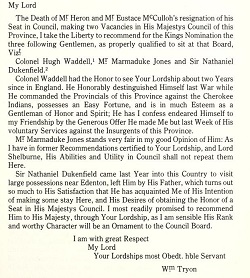ca. 1724–1787

Marmaduke Jones, colonial official, was the nephew of Sir Marmaduke Wyvell, high sheriff of Yorkshire. Educated in England, he was in Wilmington by 1753, perhaps arriving from Jamaica. He served as assistant judge of the General Court (1760), Wilmington borough recorder (1760–66), attorney general of the colony (1766–67) by appointment of Governor William Tryon, and member of the governor's Council (1771–73) by appointment of King George III. On one occasion Jones described himself as a "merchant and Eminent Lawyer" and apparently he was, indeed, considered to be an exceptional lawyer. Governor Tryon in 1768 described him as "a gentleman not inferior to any of his profession in this country." In 1770 Tryon wrote that Jones was "a gentleman of the first eminence at the bar here. . . . He possesses a genteel and easy fortune, and his abilities I am persuaded will be serviceable in Council." During 1771 Jones was requested to assist in the prosecution of insurgents at Hillsborough after the Battle of Alamance, and in the same year he was appointed to a committee to correspond with and advise North Carolina's agent in England.
In 1772 Jones returned to England where he remained for two years, undoubtedly in connection with the illness and death in 1774 of his childless uncle, Sir Marmaduke, whose rank and property he expected to inherit. Due to this long absence, he resigned from the Council in 1773.
From London Alexander Elmsley wrote to a friend in North Carolina: "'Tis but too true that Mke Jones is obliged to resume the practice of Law, his relations here treated him with a strange indifference and blasted all his hope of succeeding to the Wyvel Estate by suffering a recovery and conveying to a stranger." The baronetcy became dormant because Jones, the oldest surviving male heir, was "domiciled" in America, and the estate was awarded to Sir Marmaduke's half-sister. At her death in 1783 it passed to her husband. Jones returned to North Carolina, but had to reside in the colony a year before he could again be licensed to practice.
Although once more practicing law in Wilmington in 1774, he sold his real estate and personal property the following year. His movements during the American Revolution are vague. Aside from an appearance in 1779 as an attorney in the New Hanover County Court, he disappears from the record until 1783, when he was reported in London, preparing to return to Wilmington. He probably was again in England trying to reclaim his uncle's estate following the death of its most recent owner. In 1784 William Hooper wrote: "I have seen Marmaduke Jones: He is the greatest coxcomb alive."
Between 1784 and 1787, when he died, Jones pursued an active career as a Wilmington attorney. His will, dated 29 Aug. 1787, was proved in October. He was survived by one daughter, Elizabeth, who married Francis Brice. Apparently his wife was Judith Simmonds, sister of Peter Simmonds of Bladen County. She died in 1772, and afterwards he evidently married a widow Ivy, who had two daughters by her previous marriage (Ann Ivy Moore, wife of James Moore, and Mary Ivy De Rosset Boyd, wife of Dr. Moses John De Rosset and then of Adam Boyd).